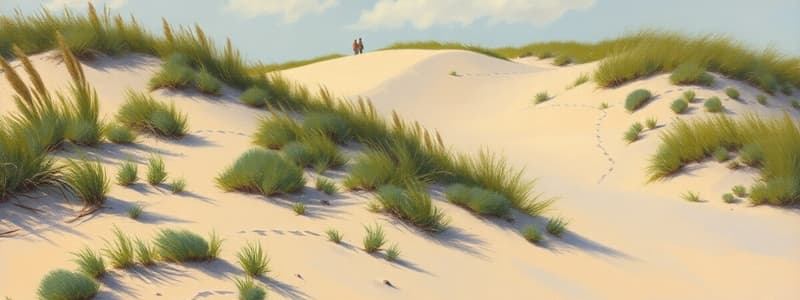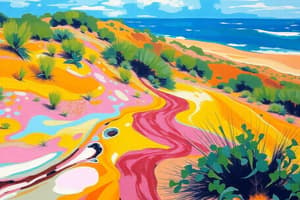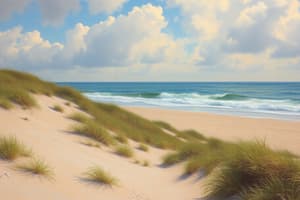Podcast
Questions and Answers
The dunes start out as ______, very small dunes.
The dunes start out as ______, very small dunes.
young
Deposition occurs when sand comes in contact with an ______ such as a rock, driftwood or litter.
Deposition occurs when sand comes in contact with an ______ such as a rock, driftwood or litter.
obstacle
Dunes become vegetated through colonisation by ______ species.
Dunes become vegetated through colonisation by ______ species.
pioneer
Examples of pioneer species include prickly saltwort and ______ grass.
Examples of pioneer species include prickly saltwort and ______ grass.
Newly formed dunes are very ______ and can easily be washed away in high tides.
Newly formed dunes are very ______ and can easily be washed away in high tides.
Flashcards
Embryo Dunes
Embryo Dunes
Young, very small dunes that form at the top of the beach.
Aeolian Transport
Aeolian Transport
The movement of sand by wind.
Sand Deposition
Sand Deposition
Sand is deposited when it hits an obstacle, like a rock or piece of driftwood.
Pioneer Species
Pioneer Species
Signup and view all the flashcards
Fragile Embryo Dunes
Fragile Embryo Dunes
Signup and view all the flashcards
Study Notes
Coastal Dune Formation
- Young dunes are small.
- Windblown sand from the shoreline builds dunes above the high-tide line.
- Sand deposition occurs when it encounters obstacles like rocks, driftwood, or debris.
- Pioneer plant species, like prickly saltwort and lime grass, colonize the dunes.
- Sand accumulates around these plants, nourishing their growth.
- These dunes are unstable and easily eroded by high tides.
Studying That Suits You
Use AI to generate personalized quizzes and flashcards to suit your learning preferences.




